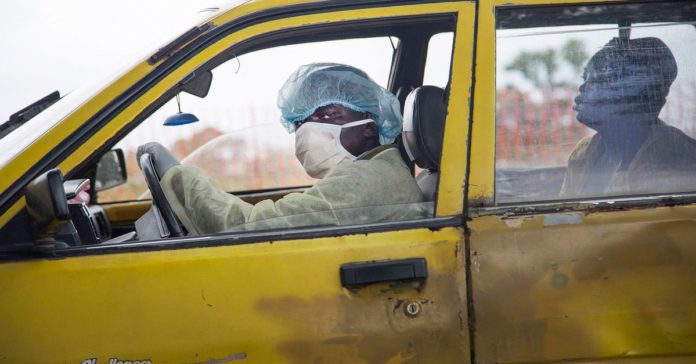Eyewitness to Hell: Life in Ebola-Ravaged Liberia

This wasn’t a war-torn country, where the dangers are visible. In Liberia today, it’s the things you can’t see that are most lethal. One twist of an infected door knob or an accidental brush past a stranger can be your death sentence.
—
I spent my first day in the city of Monrovia documenting West Point, one of the largest slums in Liberia. It was under a government quarantine when I was there. I remember not knowing what I needed to wear as I slipped under the thin, yellow rope that divided the slum from the rest of the city.
I put on gloves.
As I got further into the neighborhood, I could feel the tension this quarantine had created. It was like a virus in itself, and I was walking right into it.
I added more layers of equipment.
By the time I arrived at a school that had been turned into an Ebola care center — Liberia shut down all schools when the outbreak spread, and many of the institutions have become stifling holding rooms where Ebola patients go to die — I was suited from head to toe in full protective gear.
—
August is part of the rainy season in West Africa. I was often taking photos in confined spaces, where the heat and humidity collided so hard my skin burst with sweat. My goggles fogged up substantially, often leaving me practically blind and forcing me to shoot in a very different way.
But it was the thing I could not feel, smell or touch, that I feared the most. Before that day, Ebola was an abstract idea for me. It was a virus that existed thousands of miles way, both physically and metaphorically.
Then I saw a dead woman on the floor surrounded by pools of her own vomit, and Ebola became real. Suddenly, there was an invisible killer in the very room in which I was standing.
—
After the first day I began to adapt quickly, creating systems and routines to disinfect myself and my gear. There were chlorine buckets at the entrances of buildings to keep people from tracking the virus in and out. I found myself retracing my steps in my hotel room. I was careful not to walk on possibly contaminated parts of the floor. I saturated my hands, face and cameras in hand sanitizer over and over and over again.
Within just a day or two, my mind and body adapted. Don’t touch my face. Don’t touch anyone or anything.
Throughout West Africa there are a lot of rumors, myths and misinformation about Ebola. As a result, communities struggling with real dangers and few choices also contend with anger, frustration and fear. There were some neighborhoods that believed Ebola wasn’t a real threat and that the people in their community were dying due to a lack of food or Malaria. Even the people of West Point accused me of bringing the Ebola virus to their community.
But perhaps most troubling was how some Liberians saw the health care workers and other people working with those who were dying — or had already died — from Ebola.
“The people have driven us away. We are no longer accepted by our families,” Matthew Kruah, a member of the burial team, told me. “Because of this sickness, they have totally disowned us.”
—
Leaving Liberia proved incredibly difficult. I was extremely concerned about contracting the virus and getting sick in Liberia, where there are few health care options. Two days before I was scheduled to leave, nearly all flights in and out of the country were cancelled. I was eventually able to book a seat on the only airline still flying.
When I landed in the U.S., the fear that I experienced when I first arrived in Liberia gripped me again.
I was anxious. I felt sick. I took my temperature multiple times a day. I confined myself to the guest room in my apartment for days for fear of infecting my family and loved ones. I couldn’t hug my girlfriend, my mother or my dog. I was in a constant panic that I would be responsible for bringing Ebola to the the United States.
But at the lowest point of my self-mandated quarantine, my thoughts were mostly with the people of Liberia.
I thought of the people of West Point who were convinced their families were dying of Malaria and starvation. Were their loved ones still alive?
The orphaned children who lost their parents, only to be rejected by other family members out of the fear of further infection. Did they make it?
The extraordinary group of men who served as a community burial team. Were they dead?
I may never know.
